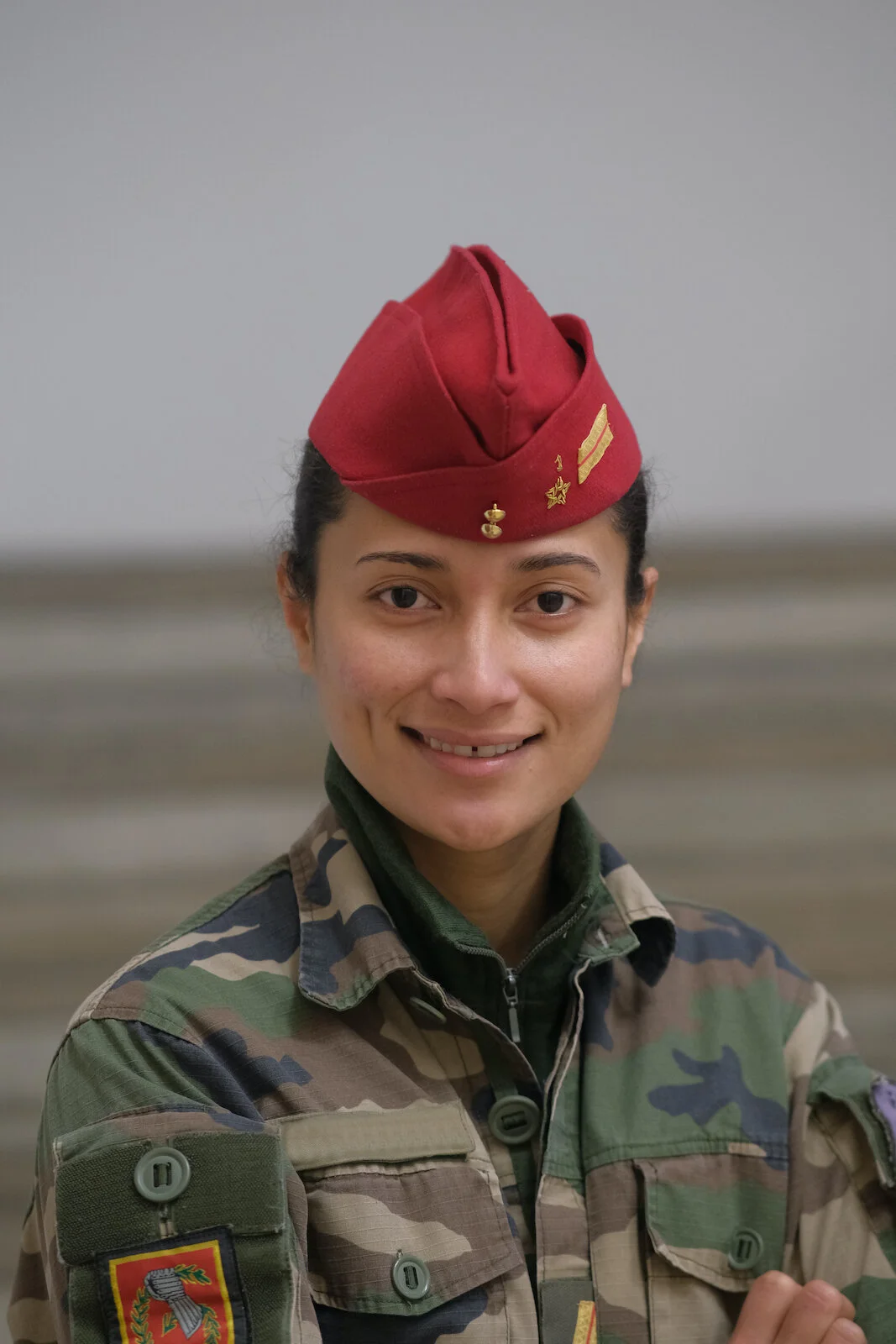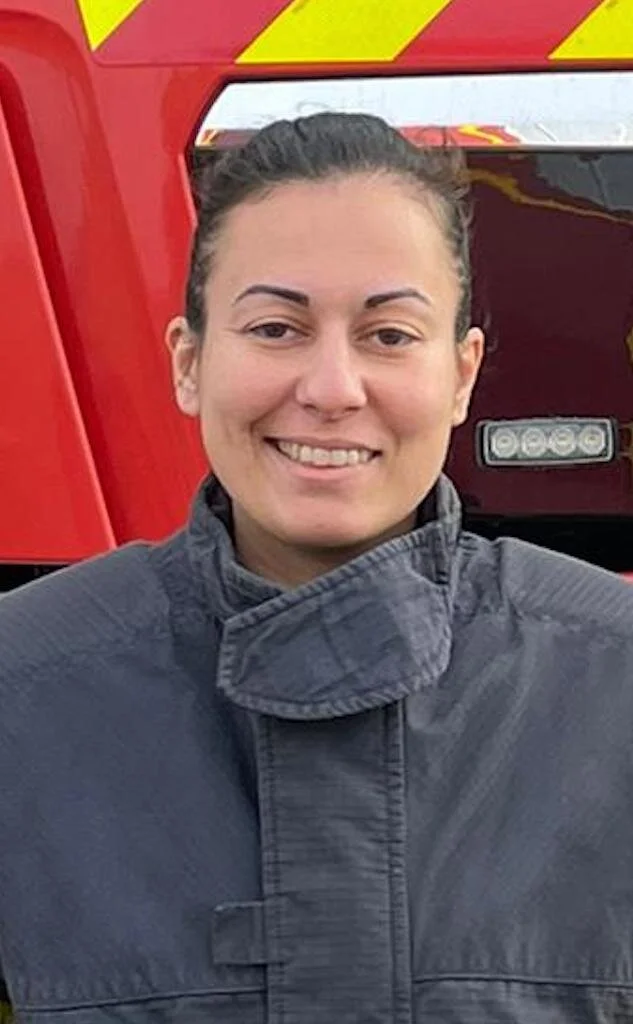Regimental Sergeant-Major Malia
Malia wears the distinctive red cap of the 1st Spahis Regiment. Photo credit: Sergeant Valentin/1st Spahis Regiment
Malia was 18 and looking for adventure. She found it in Valence, at the foot of the French Alps more than 22,000 km, a 36-hour flight and an 11 hour time difference from home. The young woman, today a radio transmitter and top-performing athlete, was born and raised on Wallis, which, together with the islands of Futuna and Alofi, form a French overseas collectivity in the Pacific Ocean. Wallis, unlike the mountainous Futuna, ‘summits’ at 151m. Its population of 8,342 is seven times smaller than that of Valence. So it’s easy to understand why Malia, freezing on the autumn day when she arrived on the French mainland 10 years ago, out of breath dragging her suitcase up the hill from the station to the 1st Spahis Regiment, perturbed by the size and noise of her environment, was “a little scared.”
““One has to find out what is going on away from home, to dare find adventure””
She laughs about it now. “I was entirely alone, I knew absolutely nobody on the mainland but the army immediately took me in hand and it became my family,” recounts this bright young woman. She didn’t have the time to be homesick or get depressed. “Every day is different when you start in the Army because there are so many different training courses to attend.”
Volleyball, a national sport in Wallis and Futuna together with rugby, has been Malia’s passion since she was six. So she was right at home with the discipline and team-work of the army “because they are the same as in a sport.”
In Malia’s family, joining the army is nothing out of the ordinary. Her brother was in the army for a while, as were her uncles and her great-uncle, whom she calls “grandpa” as is the tradition amongst Wallisians. “I wanted to join the army,” she says, “even if it was a bit hard on my mother as I’m the only girl in the family and she didn’t want me to go so far away.” Today her mother is proud “but would like me to stop.” But that’s not about to happen as Malia has signed up for another 10 years and is even considering applying for the officer’s course...unsurprising, from this ambitious young woman who’d joined up as a rank-and-file soldier before being selected in 2016 for the un-commissioned officers’ course at Saint Maixent.
Malia holds the opposite hitter role in her volleyball team. Photo credit: personal photo.
When she joined up Malia was unaware that high-performing athletes could have two careers that run in parallel: one in sports, the other in the army, notably in the Army of Champions. The latter is made up of 103 sportsmen and women (of which 15 are handicapped) who form the Joinville Battalion and a dozen or so military personnel who are not members of the battalion. This is because the Joinville Battalion is made up entirely of high-performing athletes who join the military to get a monthly salary and to gain access to equipment and trainers they would not have otherwise; those athletes not in the Joinville Battalion are military personnel whose skill for a sport was discovered after they had joined the armed forces. It is in this latter framework that Malia submitted an application to join the Army of Champions. However, the day after our conversation, she informed me that her application had “not been refused but was not taken into account because volleyball, which is a team sport, is not yet ‘considered’, if I can put it that way, as a high-performing sport at the military level.”
Nevertheless, Malia is a member of the French volleyball military women’s team, even though she had stopped playing when she arrived on the mainland “because it was difficult to practice and this sport was unknown in my regiment.” But after a six-year hiatus, she joined a civilian club in Valence and then contacted the Army volleyball coach. Once in the Army team, Malia was then noticed by the coach for the French military team. But it’s not easy to find time for training. “The coach contacts me with the dates and then I inform my superior officers. We manage one or two weeks of training, once or twice a year,” she explains. “There are two of us from the Army in this team,” which took part in the World Military Games in Wuhan, China in October 2019 where it placed 7th. “I still dream about those Games,” she enthuses. Apparently the ‘relaxation’ evident in the Olympic Games Athletes’ Village has no place in the Military Games! “We remain military, disciplined, wearing our sports’ uniform,” she says but her eyes sparkle nevertheless!
The French volleyball military women’s team at the Wuhan Games in October 2019. Malia, wearing jersey nº2, front left. The team captain, Priscilla, wears jersey nº 3. Personal photo
Malia is just as enthusiastic about her job. She’s a radio transmitter because during her recruitment she was found to have a good ear and be a good listener. By the end of the four months she spent studying morse code for eight hours a day “I was dreaming in morse!” She was deployed with her regiment to Côte d’Ivoire in 2013 and 2015 and to Lebanon in 2020. Our conversation is taking place just a few days after Sergeant Yvonne Huynh became the first female French soldier to die in operation* when the vehicle she and a colleague were driving in Mali hit an IED (improvised explosive device) on 2 January so it’s a subject we need to broach. “Of course we talk about it and we’re a little scared,” Malia says soberly, but she immediately adds that “we know we’re soldiers. We are well aware of the risks we incur.”
Malia has built her life on the mainland where today she has “many more friends than in Wallis” and although she clearly loves her island she’s also a little critical. “The mentality there isn’t evolving. For example, it’s still frowned upon for a woman to wear a bathing-suit at the beach,” she tells me. “One has to find out what is going on away from home, to dare find adventure.” And that is true wherever one comes from!
* four other female soldiers have died whilst serving in the armed forces of whom two have received the status “died for France”
Flight Lt Laurence Briançon, 31, died on 6/5/2007 in Egypt in a plane crash (died for France)
Lance Corporal Anita Gaillon, 22, probable suicide on 18/7/2004 upon her return from deployment in Kosovo (died for France)
Corporal Camille Félix, died on 1/2/2008 in Kosovo
Lance Corporal Céline Montesse, 23, died on 27/7/2001 in Kosovo






